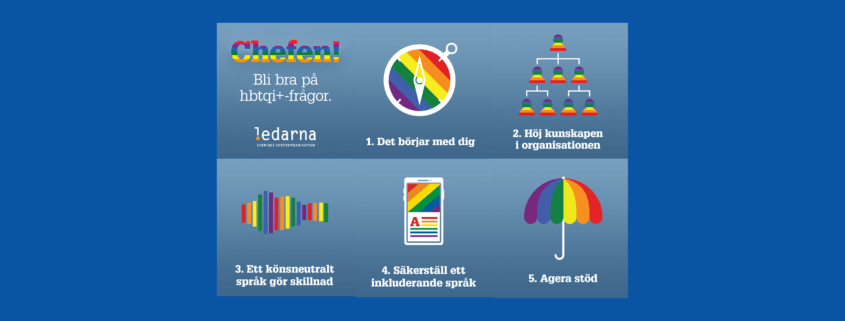Swedish leaders champion LGBTQ+ inclusivity in the workplace for Pride Month
As Pride Month has engaged civil society, Ledarna, our CEC European Managers member organisation in Sweden, spearheads a campaign to promote broader levels of inclusion within the workplace. Among the materials shared by our Swedish colleagues, there is a comprehensive checklist designed to guide managers and leaders in fostering a more inclusive environment for LGBTQ+ individuals.
Inclusivity can help to attract and retain top talent
Accept the Challenge: Becoming an Ally
Ledarna‘s campaign encourages managers to “accept the challenge and become an ally.”
The initiative underscores the crucial role of managers in creating a supportive work environment where all employees feel valued and safe. It also highlights the benefits of inclusivity, noting that it can help attract and retain top talent.

The checklist includes several key areas of focus:
1. Self-Education and Challenging Norms
Managers are urged to start with self-education, learning about societal norms and prejudices, particularly the heteronormative assumptions that often pervade workplaces.
By challenging these norms and understanding the unique experiences of LGBTQ+ individuals, managers, and leaders can create a more inclusive environment.
This involves recognising and addressing implicit biases and ensuring that language and interactions are respectful and inclusive. CEC European Managers is already doing this through the European project Beyunbi – Beyond Unconscious Bias, which will gather managers from the Nordic Countries in Copenhagen between September 9 and 10, 2024.
Managers are encouraged to ask employees about their preferred pronouns and to avoid heteronormative assumptions in everyday conversations
2. Organisational Training and Knowledge Building
Comprehensive training for the entire organization on LGBTQ+ issues is highly recommended. Resources like RFSL’s LGBTQ training and Mitt Liv’s inclusive leadership programs provide valuable tools and insights for promoting inclusion.
Additionally, regular pulse surveys and employee interviews can help gauge the organisation’s progress and identify areas for improvement.
3. Implementing Gender-Neutral Language
A critical aspect of creating an inclusive workplace is using gender-neutral language. Managers are encouraged to ask employees about their preferred pronouns and to avoid heteronormative assumptions in everyday conversations.
This practice extends to formal communications, ensuring that terms like “partner” or “parental leave” are used instead of gender-specific alternatives.
Ensuring that employees feel heard and respected can significantly impact their well-being and sense of belonging.
4. Inclusive Communication and Representation
The campaign emphasizes the importance of inclusive language and imagery in all organisational communications.
This involves reviewing marketing materials, internal documents, and external communications to ensure they reflect diversity and do not reinforce stereotypes.
Including a third gender option in forms and evaluations is another step towards inclusivity.
5. Providing Support and Building Trust
When employees share their experiences related to LGBTQ+ issues, it is vital for managers to listen and respond supportively. Ensuring that employees feel heard and respected can significantly impact their well-being and sense of belonging.
6. Measuring Inclusion and Following Up
Regularly measuring the inclusivity of the workplace is essential for identifying potential risks and areas for improvement. Tools like Mitt Liv’s inclusion measurement can be integrated into existing evaluation processes to provide valuable insights.
7. Standing as an Ally
Being an ally means actively supporting underrepresented groups. Leaders and Managers must demonstrate zero tolerance towards discrimination and harassment, addressing issues promptly and fostering a culture of respect and inclusion.
By learning from mistakes and continually striving to improve, managers can set a positive example and cultivate a learning environment.
A call to action from the Swedish leaders
Ledarna’s campaign calls managers to take concrete steps towards creating an inclusive workplace.
From challenging existing norms to implementing supportive practices, managers have the opportunity to make a significant difference.
The campaign also reminds employers of their legal responsibilities to prevent discrimination and harassment, emphasizing the importance of proactive measures.
Ledarna‘s initiative stands as a testament to the power of allyship and the critical role of inclusive leadership in building workplaces where everyone can thrive.
CEC European Managers’ position paper
Beyond the European project on unconscious bias that CEC European Managers is coordinating, CEC has also carried out advocacy campaigns and a fierce defense of equality and inclusion in the workplace.
Among the content shared and the campaigns carried out by the confederation, the position paper Mainstreaming Gender Equality in European Leadership stands out.
It can be consulted here:





